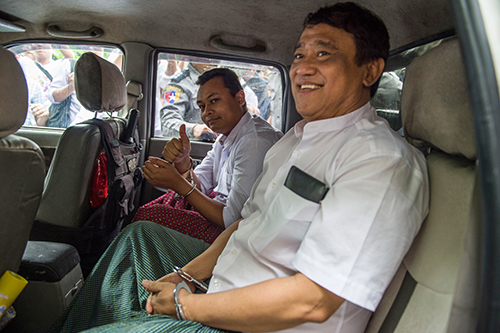New York, November 14, 2016–The Committee to Protect Journalists today called on Myanmar authorities to release Than Htut Aung, chief executive of Eleven Media Group, and Wai Phyo, chief editor of the group’s publication Daily Eleven. The journalists were detained November 11 and are being held in pretrial detention after being charged with criminal defamation, according to news reports.
The Yangon regional government filed the defamation complaint, under the country’s Telecommunications Law, after a post on Than Htut Aung’s Facebook page alleged a chief minister was involved in corruption. The post provided further details to a November 6 opinion piece in Daily Eleven. Neither the article nor the social media post named the minister allegedly involved in corruption, and the Facebook post has been deleted, according to reports.
Chief Minister of Yangon Phyo Min Thein said in a press conference on November 9 that the Facebook post was intended to defame his “personal dignity” and that he denied the allegations made in it, according to news reports. He said he planned to consult with the Myanmar Press Council before bringing a separate lawsuit over the article in Daily Eleven. The council told The Myanmar Times it would try to persuade the minister to drop the case.
“We call on the Myanmar government to immediately release Than Htut Aung and Wai Phyo, and to withdraw the defamation charges against them. It’s outrageous that journalists should be imprisoned without trial, under a democratically elected government that has promised more press freedom,” said Steven Butler, CPJ’s Asia program coordinator. “Instead of using the Telecommunications Law to justify the persecution of journalists who speak unfavorably of government officials, Myanmar authorities should be reforming the country’s outdated laws on defamation.”
Than Htut Aung and Wai Phyo will remain in Insein prison until their court hearing on November 25, according to news reports. The journalists could face up to three years in prison if convicted under the Telecommunications Law, which covers defamation or disturbances spread over telecom networks.
CPJ sent a letter to the Myanmar government earlier this year, urging it to reform several of the country’s restrictive press freedom laws.
